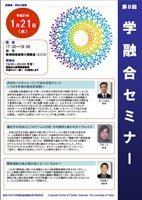AY2008 8th Gakuyugo Seminar
- Date&Time:
- Jan 21, 2009 17:30~19:00
- Venue:
- Large Lecture Room (2C0), New Frontier Science Bldg.

Aims of Next Generation Bioimaging Methods - Historical Role of Single Molecule Measurements
Professor Yuji Sasaki
Many of the elementary processes of biological phenomena can be understood by the interaction of single molecules. However, it may seem obvious but surprising that the research method in molecular biology that advanced life science was macroscopic measurement. In parallel, in situ biological phenomena have attracted attention and imaging technology has developed, and the position of optical microscopy in the field of biotechnology is becoming more and more important. If we can see the behavior of a single molecule by using the same equipment (wavelength), it is natural that many researchers want to see it, which led to the Nobel Prize in Chemistry in 2008. In this lecture, we will discuss what we have learned and what we still don't know with the advent of the single molecule measurement method, which is a representative of advanced bioimaging methods, and consider the bioimaging "image" needed for the next generation.

The genome and life as a genetic society: its maintenance and evolutionary dynamics
Professor Ichizo Kobayashi
The key to understanding this duality is the use of restriction enzymes that cut DNA. Restriction enzymes, which cut DNA, are the key to understanding this duality and are a central tool in the study of life. Restriction enzymes are thought to be a tool of bacterial infection defense against invading DNA. We have shown that restriction enzyme genes are "selfish moving genes," like viruses, that sometimes attack the host. We have shown that restriction enzyme genes are "selfish moving genes" like viruses that sometimes attack the host. We will introduce how they program the death of the host and reshape the genome, and discuss the maintenance and evolution of the genome as a society of genes.

Does development assistance help developing countries?
Associate Professor Yasuyuki Todo
In the past, developed countries have provided a large amount of official development assistance to developing countries. In recent years, there have been many quantitative analyses of the impact of aid on the economic development of developing countries. In recent years, there have been many quantitative analyses of the impact of aid on the economic development of developing countries, and the results of these studies will be discussed.
*The contents of this page were developed based on a machine translation.

